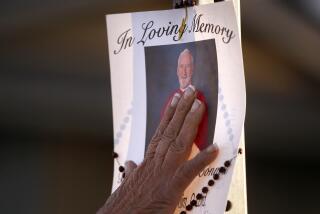Movie review: ‘Diary of a Country Priest’
- Share via
“Diary of a Country Priest” is a film that words fail. An acknowledged classic of French cinema, one of the great examinations of religion and spirituality, this 1951 masterwork by Robert Bresson has been written about rapturously by critics without number, but to truly understand it you have to experience it for yourself. And the time to do that is now.
Presented starting Friday in a new 35-millimeter print with brand-new English subtitles, “Diary” will be showing five times over three days (including a truly fitting Easter Sunday matinee) at the Los Angeles County Museum of Art’s Bing Theater. The chance to experience it this way won’t come again for years, if ever.
Made with delicacy and power by a mesmerizing writer-director on the verge of great successes like “A Man Escaped” and “Pickpocket,” “Diary” amazes by its unblinking austerity, the pure, unadulterated rigor of its visual and emotional style.
But because Bresson was a director in total control of the medium, someone who flourished within the old-fashioned 1.33:1 aspect ratio and whose framing, lighting, editing, sound and drama were exactly as he wanted them to be, what might sound like drawbacks in fact lead to transcendence.
Based on a celebrated novel by Georges Bernanos, “Diary” features a protagonist fully as pure as the filmmaker himself, a person whose struggles illuminate the difficulty of being a person of faith in general and a man of God surrounded by pettiness and venality in particular.
The priest of Ambricourt, a small town near Calais, is introduced reading voice-over narration from the journal he keeps as he starts work in this his first parish. Claude Laydu, the young actor shrewdly picked by Bresson for what turned out to be the role of his career, has the blameless face of an otherworldly believer, an aesthete of the spirit who is close to childlike in the sincerity of his belief.
Unfortunately, Ambricourt is not heaven on Earth, it’s not even close. It’s a village where no one respects or even understands a priest who doesn’t fit in with his mean-spirited neighbors. The moral cynicism of his manipulative parishioners disconcerts and frightens him, and he comes to feel “I know nothing about people and I never will.”
Yearning for a word of kindness and compassion, the priest is teased unmercifully by the children preparing for their first Communion. He expects to find a kindred soul in the local count but does not. Even the sympathetic cleric of the closest town berates his expectations, saying, “a true priest is never loved but respected and obeyed.” To make matters even worse, the priest is in such poor health he can barely eat.
It’s not surprising, then, that a crisis of belief occurs for the young priest. He finds it difficult to pray, fears God has left him and mocks himself for trying to give others the kind of peace he doesn’t have himself. What happens next to this man, what surprises both fate and faith have in store for him, are the direction in which this film is inexorably headed.
That relentless inevitability is one of Bresson’s strengths. Suffusing every frame of “Diary of a Country Priest” is the director’s conviction that this kind of spiritually connected filmmaking was not only possible but could compel an audience’s interest. You’ll never forgive yourself if you don’t show up to see how right he was.
More to Read
The biggest entertainment stories
Get our big stories about Hollywood, film, television, music, arts, culture and more right in your inbox as soon as they publish.
You may occasionally receive promotional content from the Los Angeles Times.











